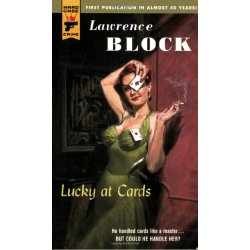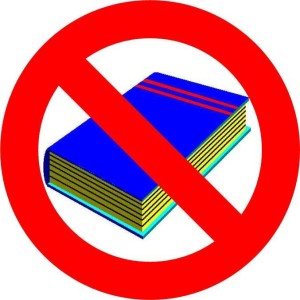Recently, Dorchester Publishing, one of the country’s oldest mass market publishers, announced that it is abandoning traditional print books in favor of digital format and print on demand.
That announcement reminded me of a conversation I had with an editor at a conference a few months ago. She predicted that in the coming digital shakeup, hardcover print runs would be smaller, trade paperbacks would boom, and mass market books would vanish entirely.
I was skeptical. After all, the great thing about mass market books is that they remain almost as cheap (or cheaper) than digital downloads, and they’re ideal reading material for all of those places you wouldn’t take your Kindle/iPad: the beach, the tub, the pool. So why would this be the first format to fall to the digital ax?
The fact that Dorchester is the first to make this shift is particularly bad news for Hard Case Crime, the imprint that has revitalized the pulp fiction industry with semi-ironic works  by major novelists such as Ken Bruen and Stephen King. Going digital stands in stark contrast to what publisher Charles Ardai was attempting to achieve–a return to the era of dime store novels you could tuck in your pocket. (On a side note, how ironic is it that Ardai, who made his money via the dotcom boom, is deadset on producing books in print?) In response to the Dorchester move, he’s apparently considering moving the entire imprint to a different publisher.
by major novelists such as Ken Bruen and Stephen King. Going digital stands in stark contrast to what publisher Charles Ardai was attempting to achieve–a return to the era of dime store novels you could tuck in your pocket. (On a side note, how ironic is it that Ardai, who made his money via the dotcom boom, is deadset on producing books in print?) In response to the Dorchester move, he’s apparently considering moving the entire imprint to a different publisher.
I was encouraged to see that in the article, a representative from Random House expressed faith in mass paperbacks. These days, most midlist and debut authors are only offered a mass market release. If that shifts entirely to digital content, it would be a shame. For me, the best part of the publishing process was the day that I opened a box to find a stack of novels with my name on the cover. I’m not sure that opening a pdf file would convey the same thrill.
So what does everyone think? Are mass markets the new eight tracks?


I have no idea but I hope not! I’m with you–when I publish my first book I want to hear the rustle of pages, not the ding of a computer.
It’s just not the same.
They may be doing it not only to cut costs, but to keep the costs of the books up. I’ve noticed with my nook that (at least on B and N), the charge about what I would have to pay with normal discounts for a hard cover book, then, even when they go to softcover print a year later and the price drops, the price isn’t even dropping to the price of the softcover. It is staying higher. The cost of printing has been getting expensive and was starting to make reading more of a “rich kid” thing almost (more for a book than a dvd- not all of us choose that), with digital books, and no printing or shipping costs, I expected the prices to come down a bit and be more available, while giving authors a better cut. It looks like the publishing companies are trying to make sure they get their cut in blood, before things shift. I would think this new gluttonous move for them will come back to bite them. I’m just sure this prices aren’t going to the authors, they are going to the publishing and printing houses.
While we authors like opening a box of our new books, the readers drive the market and we may have to settle for seeing our cover art on Amazon’s web site–a cover that only exists as a JPG. The internet is mostly an abstraction for me–magical and mysterious and unknowable.
I’m actually a bit skeptical that of any print format to die, it would be mass market. My reasoning is this: as a larger chunk of publishers’ “inventory” goes digital, they may have to increase the prices of paper books to make up for it. (That’s one rationale. Actually, Random House just announced terrific profits based on a 300% increase in digital sales, but also because they saved a lot of money with decreased returns… go figure).
So… what’s the public willing to pay for? A $9.99 mass market? A $17.95 trade paperback? Or a $29.95 hardcover? All those assume an increased price from today’s current typical pricing. My guess is the $30 figure for hardcover’s going to be a tough sell and I’m not eager to fork over $18 for trade paperback, but I’d still consider $10 for mass market, and pretty much a book-a-holic.
The real question is, why would any author go with a publisher that is all digital and get a small royalty when you can put your own books on the Amazon Kindle and other platforms yourself and get a 70% royalty? That publisher would have to be providing a lot of services you couldn’t otherwise get to make it worthwhile.
So true, BK.
Chaco Kid- I’ve noticed the same phenomenon. And I certainly haven’t been seeing a bigger cut. In fact, unfortunately my eroyalties are locked in at the same rate as my MMP ones, something I plan on remedying with my next contract.
I know that I’m far more willing to spring for a $7-10 MMP than any other format, unless I know the author and want to add the book to my hardcover collection. I rarely purchase trades anymore, now that I own an ereader.
And you’re right, Boyd. I wonder how Dorchester plans to market this to new writers.
Michelle, I’m a debut Dorchester author, my book was published by Leisure Fiction. Rumor has it, Dorchester’s going to honor all its current contracts for MMPs. I can’t speak for anyone else, but I’d feel betrayed if Dorchester stopped printing my book in MMP and only offered it in e-book format, that’s contrary to what I understood and agreed to at signing. It’s not about the money, the royalties for MMP and e-book are pretty close, but I don’t like the idea of never seeing FIRST TO KILL sitting on bookstore shelves ever again. Maybe I’m old fashioned, but I like holding a real book!
Time will tell, but for now, I’d simply appreciate a email from Dorchester telling me what’s going on. So far, I’ve received nothing.
Hi Andrew-
That’s interesting- and unfortunately, not uncommon. I’ll never understand why publishers send out press releases before contacting their authors with specifics on how a major decision will impact them. I had a similar experience last year, when my publisher opened a vanity imprint that affected our eligibility for awards. Fingers crossed they’ll honor your print contract.
I am of the opinion, for what little it matters, that while there may be a lull in mass market PB it will probably be filled by POD distributors. As long as the internet as we know it stands stores can put in orders for the number they think will sell and the printer only has to print that many. This may be a boon once all the wrinkles are worked out. Printers can produce all the books they want to sell, but not more, therefore no more overstock inventory. Fewer losses. Paperback will not disappear, its marketing will just change.
Change is coming, that’s why I’m working to get my entire backlist in digital format. Whether or not they make money is another matter.